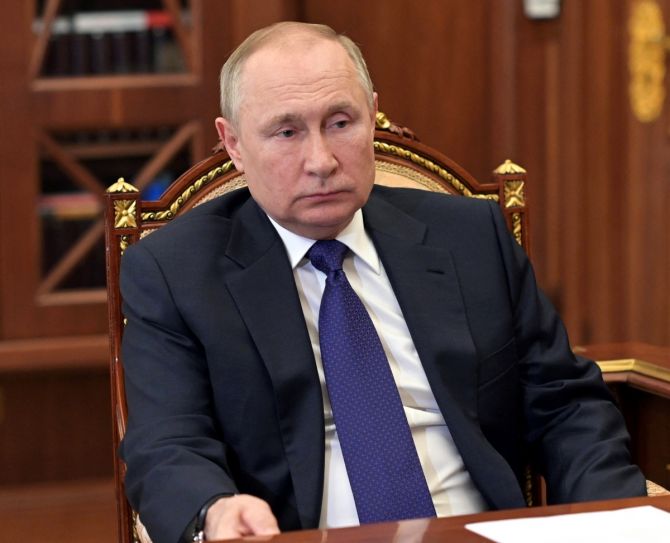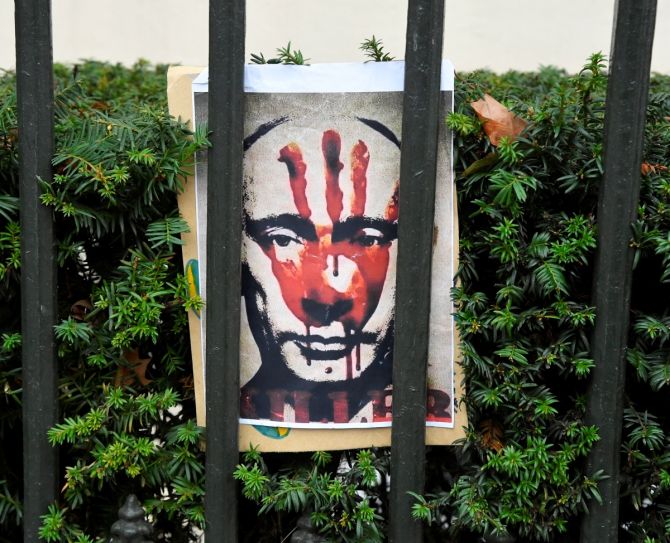'He will consolidate the Russian hold over the Eastern Russian majority provinces in Ukraine and quickly withdraw from the rest of Ukraine.'
'At all costs, the Russians should avoid attacking and capturing urban areas, else they risk getting into a quagmire,' cautions Colonel Anil A Athale (retd).

During the height of the Cold War, in the 1970s, one of the biggest nightmares for the US was a 'revolt' in the USSR's satellite countries in Eastern and Central Europe.
Dr Henry Kissinger, who had written about it at that time, worried that a popular uprising in any of these countries would be construed as a 'threat' to Soviet security and the Soviets may engender a nuclear crisis.
His lament at that time was that even after 45 years of occupation, the Soviet Union had failed to win over at least a substantial population of those countries.
The widely expressed fear was that the Soviets would blame the West for this crisis and bring about a nuclear holocaust.
The proof of this failure was that no sooner had the Soviet armies withdrawn in the 1990s, all these countries flocked to the European Union and NATO.
Any sign of dissent and likelihood of these countries 'defecting' from the Communist bloc and the erstwhile Soviet Union used brutal military force to crush the uprising.
Hungary in 1956 and Czechoslovakia in 1967 come to mind.
The primary motivation for these actions was the loss of a 'buffer' between mainland Russia and the West.
The Russian invasion of Ukraine is in essence a re-run of Hungary 1956.
Of course, there are major differences and the West is not blameless in the current situation.
The dramatic events of last week were a culmination of several factors and have a long history.
To understand what is going on and a likely outcome, a brief look at the past is inevitable.
This is even more necessary as the Western media has been pushing a one-sided narrative on the crisis and has a great impact on Indians while the Russian point of view is being ignored.
To quote a pithy saying 'Hamam me sab nange hote hai' (everybody is naked in the bathroom), the West has had its fair share of instigation that has led to the current tragedy in Ukraine.

Ukraine and Russia are like what Scotland is to the UK or nearer home, the two are like Madhya Pradesh and Uttar Pradesh, to give an Indian context.
Kyiv was the centre of Russia for a longer time than even Moscow.
Russia and Ukraine share a language, culture, religion (the Orthodox Church), and ethnicity. But a nascent 'separatist' sentiment has always existed in Ukraine.
A hundred years ago when the Soviet Union was in its infancy, the Western powers put together a force of political conservatives, royalists, and Ukrainian nationalists to fight the Soviet Union.
These forces were called the 'White Russians' and they fought the Red Army, but were soundly defeated.
During the Second World War, when Hitler's Germany invaded the USSR and captured Ukraine, the remnants of these White Russians collaborated with the Nazis.
Post-WWII, these very elements were co-opted by the Americans in their fight against the USSR during the Cold War.
In 1991 when the Soviet Union disintegrated, these pro-Western elements engineered the 'Orange Revolution' in a bid to oust the Russian influence from Ukraine.
A look at what happened in Georgia (the country and not the state in the USA) in 2008 is instructive.
On a personal note, I spent two weeks in Georgia in October 2019 and traveled extensively in that beautiful country.
Abkhazia and South Ossetia, parts of Georgia where ethnic Russians are in A majority, have been under Russian control since 2008.
Like in Ukraine, there is a fair presence of ethnic Russians in the rest of Georgia as well and like Ukraine, Georgia has a long history of being a part of TSarist Russia and a mainstay of the USSR.
The longest-ruling leader of the USSR, Stalin, was a Georgian. Georgia, like Russia, is a follower of the Orthodox Church and Russian is the second language in Georgia.
Yet, everywhere we went and interacted with ordinary Georgians, their aspiration was to join the European Union.
This, despite the fact that Georgia has no direct land link with the EU and under the current rules cannot realistically hope to join EU or NATO.
As a sign of this European influence, we found EU flags flying alongside Georgian flags at many places.
The common people are making strenuous efforts to learn English and do away with Russian.
One can make an educated guess that the situation is not very different in Ukraine.
The seduction by the West is due to economic factors in large measure.
Russia, even after thirty years of market reforms, is ranked 43 out of 45 European countries in terms of per capita GDP.
It is 25% of Italy, itself not the shining economy of the EU. On purely economic terms, the erstwhile republics of the Soviet Union have no attraction for Russia.

The greatest Russian tragedy is that despite its long association and large-sized economy vis a vis these smaller countries, it has close to zero 'soft power'.
It is this lack of soft power that Russia has failed to develop under Vladimir Putin's two-decade-long rule.
Thus, to secure its legitimate national interest of security, the only option for Russia is to use its hard power.
A million dollar question is will Putin show statesmanship and quickly withdraw from Ukraine or get bogged down in urban warfare and cause casualties amongst the 'fraternal' people of Ukraine?
Over centuries the two countries are closely intertwined and there is a great deal of sympathy for the plight of the Ukrainian people.
It is only a matter of time that opposition to Putin's Ukraine adventure develops in Russia.
Historically speaking, both Hitler and Stalin were expansionist dictators.
The difference between the two was that, unlike Hitler, Stalin knew when to stop.
At the end of the Second World War, Soviet power was such that Stalin could have easily over-run Western Europe.
But he wisely stayed his hand and retained only Eastern and Central Europe as a buffer zone.
If Putin is wise, he will consolidate the Russian hold over the Eastern Russian majority provinces in Ukraine and quickly withdraw from the rest of Ukraine.
At all costs, the Russians should avoid attacking and capturing urban areas, else they risk getting into a quagmire.
The NATO countries may not intervene directly, but can certainly help Ukraine through domination of electronic and cyber fields and thus degrade Russia's hard power.
Every passing day will make the Russian presence in Ukraine unviable.
Colonel Anil A Athale is a military historian whose earlier columns can be read here.
Feature Presentation: Rajesh Alva/Rediff.com










